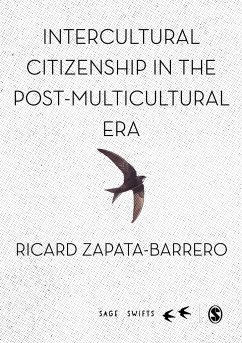This book explores the intercultural policy paradigm emerging within diversity and migration studies. Drawing on empirical studies of cultural diversity and placing a focus on the current crises of identity in Europe, Zapata-Barrero argues for an intercultural model of citizenship that prioritises contact between diverse people. In looking forward to a post-multicultural era, his analysis suggests how we can better manage the challenges presented by our increasingly complex, multifaceted societies.
This thoughtful text will appeal to students and scholars across politics, sociology, anthropology and social psychology, as well as policy makers and social entrepreneurs around the world grappling with issues around migration, diversity and citizenship.
Ricard Zapata-Barrero is a Full Professor of Political and Social Sciences at the Universitat Pompeu Fabra (Barcelona, Catalonia, Spain). He is also Director of the Interdisciplinary Research Group on Immigration at UPF, and Master in Migration Studies. He is member of the Board of Directors for IMISCOE and Chair of the External Affairs Committee. For information about publications, go to his webpage: www.upf.edu/web/ricard-zapata
This thoughtful text will appeal to students and scholars across politics, sociology, anthropology and social psychology, as well as policy makers and social entrepreneurs around the world grappling with issues around migration, diversity and citizenship.
Ricard Zapata-Barrero is a Full Professor of Political and Social Sciences at the Universitat Pompeu Fabra (Barcelona, Catalonia, Spain). He is also Director of the Interdisciplinary Research Group on Immigration at UPF, and Master in Migration Studies. He is member of the Board of Directors for IMISCOE and Chair of the External Affairs Committee. For information about publications, go to his webpage: www.upf.edu/web/ricard-zapata
Managing societal diversity is one of the greatest governance challenges of our century. This volume argues that facing this challenge requires a new concept of citizenship intercultural citizenship. It offers solid academic arguments for a bold political statement that the shift from the nation-focused to a rights-focused paradigm of diversity management is a matter of profound cultural change. Indeed, the intercultural paradigm is a kind of a neo-Renaissance project which makes collective identity a normative result of the interplay of multiple, evolving individual identities the exact opposite of the historical process of building national identities. The main contribution of the book resides in the insights about ways in which one can engineer intercultural citizenship institutionally and in policy practice, and how it can be nurtured in individual attitudes and behavior.
Irena Guidikova, Head of Inclusion and Anti-discrimination Programmes, Council of Europe.
Irena Guidikova,
Irena Guidikova, Head of Inclusion and Anti-discrimination Programmes, Council of Europe.
Irena Guidikova,

